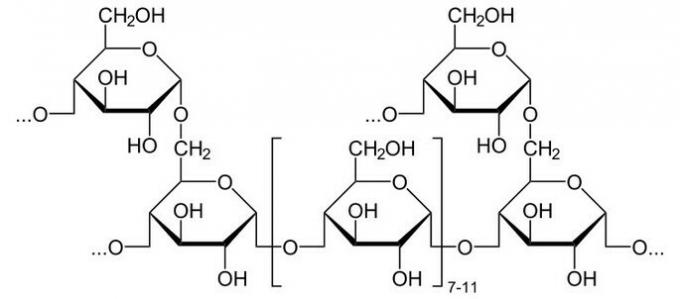What is Glycogen?
Glycogen (C6H10O5)no it is a reserve of energy produced and stored by our body by transforming the carbohydrates we eat into glucose.
The main source of energy for living beings is glucose, which is a simple carbohydrate. It turns out that when we eat, our cells are left with a lot of glucose, so the blood glucose rate goes up.
At that moment, our organism takes the opportunity to store energy in the form of glycogen, also known as “animal starch”, which is a food reserve. This reserve is stored in the liver and muscles, where it remains until our bodies need it.
Glycogen Metabolism
Glycogen can be found mainly in the liver and myocytes, which are muscle cells.
What is stored by the liver can be used by other organs and cells in the body, but the same cannot be said for glycogen stored by the muscles, used only by the muscles themselves.
Synthesis
The synthesis of glycogen, or glycogenesis, takes place through the action of insulin regulation.
After we eat, the glucose level in our blood increases. Next, the pancreas releases insulin, activating glycogen synthetase. This is an enzyme that allows excess glucose to be turned into glycogen.
Degradation
Glycogen degradation, or glycogenolysis, happens through the action of glucagon regulation.
In periods of fasting, when the glucose level is low, glucagon secretion increases, indicating the need to use the energy reserve stored in the body. This process is possible thanks to the participation of glycogen phosphorylase.
glycogen structure
Glycogen is a naturally branched and compact polymer made up of glucose molecules.

What is the function of glycogen?
Glycogen acts as an energy source by supplying glucose to the body and is found mainly in liver and muscle cells.
In liver cells, glycogen is responsible for normalizing blood sugar levels. Decreased glucose in the bloodstream causes glycogen to break down and convert to glucose. Likewise, when levels are high, glucose is stored in the form of glycogen.
In muscle cells, glycogen is responsible for providing energy during muscle work. Glucose is released into the bloodstream in response to exercise or under stress.
The energy reserve of glycogen in the uterus is also responsible for providing the energy necessary for the embryo to develop during pregnancy. In addition to the examples cited, lesser amounts of glycogen are stored elsewhere in the body, such as in the brain's astrocytes.
Read too:
- Glucose
- Carbohydrates or Glyces
- Polymers


